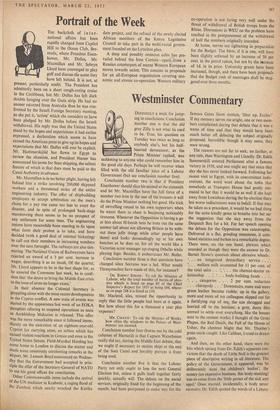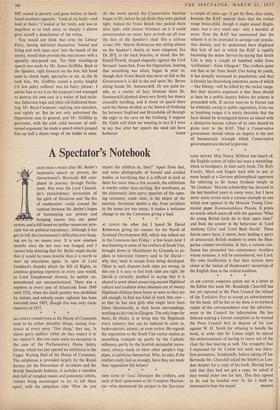Westminster Commentary
Conclusion number two is that if President Eisenhower should slice his second at the sixteenth and let Mr. Macmillan have the full force of a number two iron in the seat of the trousers it will do the Prime Minister nothing but good. His trick of swivelling round to his own supporters when he wants them to cheer is becoming noticeably tiresome. Whenever the Opposition is having a go at him about H-bomb tests he trots out the same answer (all about not allowing Britain to be with- out these jolly things while other people have them) and looks demandingly up at his own benches as he does so, for all the world like a Victorian actor-manager up-staging Othello while playing Iago. Besides, it embarrasses Mr. Butler.
Conclusion number three is that questions have changed since Socrates was a lad. What would Thrasymachus have made of this, for instance?
DR. BARNET STROSS : To ask the Minister of Labour, why the total number of bursts of abra- sive wheels is listed on page 85 of the Chief Inspector's Report for 1955 as being 184, where- as on page 268 it is listed as 110.
Mr. Macleod, alas, missed the opportunity to reply that the little people bad been at it again. But how about this for a thousand a year plus expenses?
MR. CROUCH: To ask the Minister of Works, how often the windows in the Palace of West- minster are cleaned.
Conclusion number four (borne out by the cold columns of Hansard) is that Captain Waterhouse really did say, during the Middle East debate, that we ought if necessary to station ships at the end of the Suez Canal and forcibly prevent it from being used.
Conclusion number five is that the Labour Party not only ought to lose the next General Election but, unless it pulls itself together fairly quickly, actually will. The debate on the social services, originally fixed for the beginning of the month, had been postponed to make way for the famous Goon Show motion, 'Shut up, Eccles!' If my memory serves me aright, one or two mem- bers complained during that debate that it was a waste of time and that they would have been much better off debating the subject originally proposed. Incredible though it may seem, they were wrong.
The reasons are not far to seek; no farther, at any rate, than Warrington and Llanelly. Dr. Edith Summerskill entered Parliament after a famous victory in 1938, and one might say that since that day she has never looked forward. Following her recent visit to Egypt, with its concomitant indis- cretions, the word went about the town that somebody at Transport House had gently inti- mated to her that it would be as well if she kept away from Lewisham during the by-election there lest worse indiscretions were to befall. If that may be taken as a precedent, it would be no bad thing for the same kindly genie to breathe into her ear the suggestion that she stay away from the Despatch Box for a bit. For her speech opening the debate for the Opposition was catastrophic. Delivered in a flat, grinding monotone, it com- bined statistics and bathos to a remarkable degree. There were, on the one hand, phrases which sounded as though they were the answer to Dr. Barnet Stross's question about abrasive wheels : . . an integrated domiciliary service • .
. . welfare milk accounted for 11 per cent. of the total sales . . . • the chemist-doctor re- lationship . . . . body-building foods . .
. categories . . . 2 per cent. reduction . • . chiropody . . .' Downstairs, more and more green leather became visible; up in the gallery, more and more of my colleagues slipped out for a fortifying cup of tea; the sun shrugged and hurried off to the horizon; a grey, dusty film seemed to settle over everything, like the houses next to the cement works; I thought of the Great Plague, the Red Death, the Fall of the House of Usher, the chestnut blight that Mr. Thurber's great-uncle caught. Like Caliban, I cried to dream again.
And then, on the other hand, there were the bits which sprang from Dr. Edith's apparent con- viction that the death of Little Nell is the greatest piece of descriptive writing in all literature. The policy of the Government, it appeared, was to deliberately stunt the children's bodies'; the money (an expensive business, this body-stunting) was to come from the 'little purses of the sick and aged.' Once stunted, incidentally, a body never recovers; Dr. Edith quoted the words of a Labour MP, raised in poverty and gone before, to hard- faced members opposite : 'Look at my body—and look at theirs.' I looked at her body, and was so ungallant as to look away so sharply I almost gave myself a detachment of the retina.
You would not think that even the Labour Party, having delivered themselves 'bound and living and with open eyes' into the hands of the enemy, would then provide the executioner with a specially sharpened axe. Yet their winding-up speech was made by Mr. James Griffiths. Back to the Speaker, right forearm on the box, left hand used to clutch lapel, spectacles or air, as the fit took him, Mr. Griffiths ranted a pretty lungful ('A few paltry millions' was his fancy phrase : I advise him to try it on the taxpayer) and managed to destroy his own case in a welter of bad statis- tics, fallacious logic and plain old-fashioned hum- bug. Mr. Boyd-Carpenter, replying, was merciless, and rightly so. But he not only pulverised the Opposition case in general, and Mr. Griffiths in particular, with the cold, solid hammer of well- turned argument; he made a speech which jumped him up half a dozen rungs of the ladder at once. As the word spread the Conservative benches began to fill; before he sat down they were packed tight. Indeed the Front Bench was packed more than tight; with sixteen Ministers on it it could accommodate no more; later arrivals sat all over the dais of the Speaker's chair like a tableau vivant (Mr. Martin Redmayne was sitting almost on the Speaker's shoes), or were relegated, like Dr. Hill, to the back benches, or stood, like Mr. Enoch"l'owell, draped elegantly against the Civil Servants' loose-box. Even the Opposition, hearing, that something was afoot, began to pour in; though their Front Bench was never so full as the Government's, it did in the end sport Mr. Bevan sitting beside Dr. Summerskill. Or not quite be- side, as a matter of fact; between them Dr. Summerskill plonked down very firmly her dreary crocodile handbag, and it stood on guard there until the House divided, as the Sword of Nothung lay between Siegfried and Briinnhilde all through the night in the cave on the Felsberg. I suppose Dr. Edith will think me wanting in tact if I were to say that after her speech she need not have



































 Previous page
Previous page